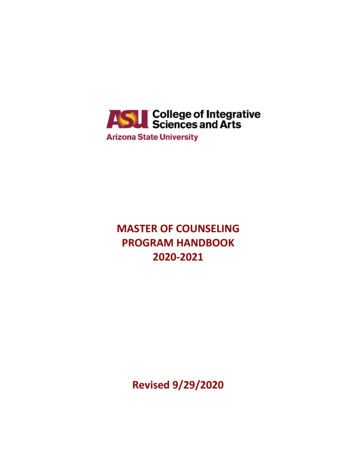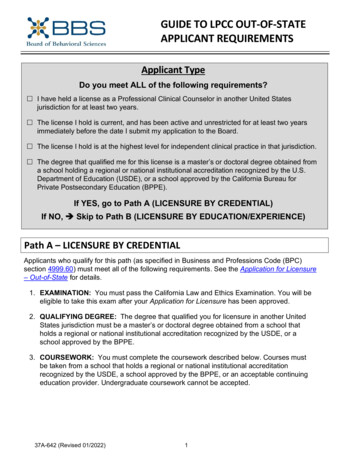
Transcription
VISTAS OnlineVISTAS Online is an innovative publication produced for the AmericanCounseling Association by Dr. Garry R. Walz and Dr. Jeanne C. Bleuerof Counseling Outfitters, LLC. Its purpose is to provide a means ofcapturing the ideas, information and experiences generated by theannual ACA Conference and selected ACA Division Conferences. Paperson a program or practice that has been validated through research orexperience may also be submitted. This digital collection of peer-reviewedarticles is authored by counselors, for counselors. VISTAS Online containsthe full text of over 500 proprietary counseling articles published from2004 to present.VISTAS articles and ACA Digests are located in the ACAOnline Library. To access the ACA Online Library, go tohttp://www.counseling.org/ and scroll down to the LIBRARYtab on the left of the homepage.nUnder the Start Your Search Now box, you may searchby author, title and key words.nThe ACA Online Library is a member’s only benefit.You can join today via the web: counseling.org and viathe phone: 800-347-6647 x222.Vistas is commissioned by and is property of the American CounselingAssociation, 5999 Stevenson Avenue, Alexandria,VA 22304. No part of Vistas may be reproduced without expresspermission of the American Counseling Association.All rights reserved.Join ACA at: http://www.counseling.org/
Suggested APA style reference:LeBeauf, I., Smaby, M., & Maddux, C. (2009). Adapting counseling skills for multicultural and diverse clients. In G. R. Walz,J. C. Bleuer, & R. K. Yep (Eds.), Compelling counseling interventions: VISTAS 2009 (pp. 33-42). Alexandria, VA:American Counseling Association.Article 4Adapting Counseling Skills for Multiculturaland Diverse ClientsPaper based on a program presented at the 2009 American Counseling Association Annual Conferenceand Exposition, March 19-23, Charlotte, North Carolina.Ireon LeBeauf, Marlowe Smaby, and Cleborne MadduxMulticultural counseling takes place when a counselor andclient are from differing cultural groups. Because significantdemographic changes are taking place in the United States,multiculturalism is becoming increasingly important. In fact,multiculturalism has been called the “fourth force” in helping(Pederson, 1991, as cited in Skovholt & Rivers, 2007, p. 15). The otherforces include psychodynamic, humanistic/existential, and behavioralcounseling theories and methods. Knowledge and skills related to allfour of these forces are critical for understanding behavior in thecounseling process and for effective counseling in a multiculturalcontext. Therefore, seven divisions of the American CounselingAssociation (ACA) have endorsed the multicultural counselingcompetencies developed by the Association for MulticulturalCounseling and Development (AMCD; Sue & Sue, 1999).However, whether or not mental health practitioners in thetherapeutic setting subscribe to, or even understand, the principlesand dynamics of what it means to be culturally competent remains alargely unanswered question (Tackey, 2001). Counselor educationfaculty often urge students to celebrate diversity, but the average33
Compelling Counseling Interventionsstudent is not equipped with knowledge of the components of theRESPECTFUL Counseling Cube (D’Andrea & Daniels, 2001).These include religion and spirituality (R), economic classbackground (E), sexual identity (S), psychological maturity (P),ethnic and racial identity (E), chronological stage (C), trauma (T),family background (F), unique physical characteristics (U), andgeographical location (L).The evolution of counseling skills training has moved from anill-defined process to more clearly delineated approaches. Fivepioneers have made important contributions to this evolution. Theseinclude (a) Carl Rogers, (b) Robert Carkhuff, (c) Norman Kagan, (d)Alan Ivey, and (e) Stanley Baker. These influential individuals wereresponsible for (a) Person-Centered Therapy, (b) Human ResourceDevelopment, (c) Interpersonal Process Recall, (d) Microcounseling,and (e) the Meta-Analytic and Narrative Review Approach,respectively. (The latter is based on a narrative and meta-analyticreview of three of the other approaches.) Elements from the trainingapproaches of the first four of these individuals and from Baker'smeta-analysis have been used to develop the Skilled CounselorTraining Model (Smaby & Maddux, in press).The Skilled Counselor Training Model (SCTM)The Skilled Counseling Training Model (SCTM) is a skillsbased training program that promotes attainment of skills through theuse of modeling, mastery, persuasion, arousal, and supervisory feedback(Smaby, Maddux, Torres-Rivera, & Zimmick, 1999). In the SCTM,skills are divided into three stages: exploring, understanding, and acting(Smaby et al., 1999). For each stage, the Model illustrates (a) a purpose,(b) two counseling processes, and (c) six counseling skills.The Exploring StageThe purpose of the exploring stage is to help clientsdetermine where they are in relationship to the problems they are34
Adapting Counseling Skills for Multicultural and Diverse Clientsfacing. The attending process is a component of this stage andincludes eye contact, body language, and verbal tracking. Thequestioning and reflecting process, also a component of the exploringstage, includes open-ended questioning, paraphrasing, andsummarizing. The exploring stage should be marked by high levelsof client talk and minimal counselor interruption. During this stage,the counselor should communicate acceptance, empathy, and positiveregard. At the conclusion of the exploring stage, clients should feelfully and completely supported to explore issues from their ownviewpoints (Smaby & Maddux, in press).The Understanding StageThe purpose of the understanding stage is to help clientsrecognize where they are in relationship to where they want to bewith regard to the problems they are facing. During this stage, thecounselor should confront the client concerning inconsistencies inbehavior and attitudes. The counseling process of interchangeableempathy includes the skills of stating feelings and content, selfdisclosure, and asking for concrete and specific expressions. Theadditive empathy process includes the skills of immediacy;identifying general problem situations, actions taken, and feelings;and caring confrontation. Thus, when the understanding stageconcludes, clients should have a fresh perspective or be able togenerate new viewpoints regarding their life challenges (Smaby &Maddux, in press).The Acting StageThe purpose of the acting stage is to help clients identify whatthey need to do to get to where they want to be with regard toproblems. The decision-making process includes the skills ofdeciding, choosing, and identifying consequences. At this point, thecounselor should define clients' situation as consisting of a choice to(a) change ineffective coping behaviors or (b) continue to allow these35
Compelling Counseling Interventionsfutile patterns to be problematic (deciding skill). The counselorshould then outline the thoughts and feelings that previouslyprevented clients from implementing change (choosing) whileexploring the positive values that are important to clients as a resultof the decision (skill of identifying consequences). The contractingprocess includes the skills of reaching agreements; setting deadlines;and reviewing goals and actions to determine outcomes.If the counselor has employed sound exploring stage andunderstanding stage skills, it is rare that clients will opt for no change,because it is obvious that this would be self-defeating. However, ifclients do opt for no change, the counselor should revert back toprevious stage skills and attempt to build a relationship that will resultin positive client outcomes (Smaby & Maddux, in press).This article will describe how to use the RESPECTFUL Cubeand the Skilled Counselor Training Model (SCTM; Smaby &Maddux, in press) in multicultural counseling relationships.Using the RESPECTFUL Cube to Assess Potential ConflictingViews Between a Counselor and a ClientThe first step is to identify how a counselor's attitudes relatedto the 10 domains of the RESPECTFUL Cube can conflict withviews of clients. This exercise is designed to help counselors becomemore aware of their own beliefs and biases about clients who arefrom diverse groups and backgrounds. In this exercise, counselorsuse the 10 domains of the RESPECTFUL Cube to evaluatethemselves on each issue.For each of the 10 domains or issues, counselors should writea short statement about their views and how these views could be asource of contention with clients who have different views of theseissues. Counselors should then use these 10 written statements as abasis for planning to modify how they interact with clients who mayhold differing views.36
Adapting Counseling Skills for Multicultural and Diverse ClientsAdapting the SCTM Skills for Addressing the RESPECTFULCube DomainsThe second step in this exercise is to adapt skills of theexploring, understanding, and acting stages to various domains ofthe RESPECTFUL Cube. The following section describes howexploring stage skills can be adapted for ethnic and racial identitywhen working with American Minority clients.Adapting the Exploring Stage Skills to Clients From DifferentEthnic/Racial (E) BackgroundsClients from various racial backgrounds may have differentperceptions of the exploring stage skills of eye contact, bodylanguage, verbal tracking, open-ended questioning, paraphrasing, andsummarizing. It is imperative that the counselor consider how theseskills will affect rapport with diverse clientele.When beginning to counsel American Minority clients(Asian-American, American-Indian, African-American, and LatinoAmerican), it is important to assess the level of acculturation of theclient. For example, if the level of acculturation is minimal, directeye contact, demonstrative body language, and continuous verbaltracking may be perceived as impolite by Asian American clients.The counselor will need to maintain a heightened awareness of howthese skills are affecting the counseling session and reduce the use ofthese skills accordingly (Smaby & Maddux, in press).Native American clients who maintain strong ties to theirtribal groups may perceive persistent eye contact, direct questions,repetitive paraphrasing and summarizing as being invasive andauthoritative. Such clients may prefer more oblique and circularquestioning, analogies, stories related to the issues or problems ofconcern, and the use of silence. It is also important for the culturallycompetent counselor to have a working knowledge of and respectfor clients' tribal customs and/or belief systems (Smaby & Maddux,in press).37
Compelling Counseling InterventionsLike some other American Minority clients, African-Americanclients are likely to suffer from cultural mistrust of counselors. Thiscultural mistrust can often be traced to past racist and discriminatorypractices. Clients who present cultural mistrust often appreciate anacknowledgement and acceptance of their frustration with the system.The counselor should also attempt to create an environment whereAfrican-American clients are able to express themselves freely withoutprejudice or judgment (LeBeauf, 2008).Acculturation stress and economic issues often play a majorrole in contributing to mental health issues in Latino communities.When counseling Latino clients, it is important to recognize theprofound impact that immigration laws and racial discriminationhave had in Latino communities. Casual rather than persistent eyecontact along with genuine empathy-based paraphrasing may also behelpful in building rapport with Latino clients. Also, recognizing theimportant roles of the nuclear and the extended family in counselingcan be important to Latinos, who often consider themselves closelytied to family and community (Smaby & Maddux, in press).Adapting the Understanding Stage Skills for AddressingSexual Identity (S)Issues of gender and sexual orientation are often overlookedby counselors in training. The understanding stage of the SCTMfocuses on skills of stating feelings and content; self-disclosure;asking for concrete and specific expressions; immediacy; identifyinggeneral problem situation, action taken, and feelings; and confrontingin a caring way (Smaby & Maddux, in press). The followingexamples are how the skills of the understanding stage of the SCTMcan be useful in understanding issues of gender and sexualorientation in counseling.Understanding Stage Skills With Females and MalesDistinctive communication styles characteristic of eachgender should be considered. For instance, a female may find the38
Adapting Counseling Skills for Multicultural and Diverse Clientsunderstanding stage skills of stating feelings and content, selfdisclosure, and asking concrete questions to be blunt and lackingdimension. Females may prefer a conversational style of counselingthat allows them to express more personal and emotional feelings.In contrast, males may find the use of these skills beneficial to theirprogress in session, but may struggle to identify their emotions. Also,the understanding stage skills of asking for concrete and specificexpressions; immediacy; identifying problem situations, action taken,and feelings; and confronting in a caring way may be considered bymales to be overly intrusive and emotionally charged (Smaby &Maddux, in press). In either case, the counselor needs to monitorclients' personal communication styles and adjust use of theunderstanding skills accordingly. If the counselor senses intimidation,withdrawal, or anxiety by the client, the counselor should provideample time and space to allow clients to express themselves in a waythat is comfortable.Understanding Stage Skills With Lesbian, Gay, Bi-Sexual,or Transgender ClientsThe use of understanding stage skills with Lesbian, Gay,Bisexual, Transgender or (LGBT) clients may be considered toointrusive or direct, and may result in clients feeling vulnerable orattacked. Culturally competent counselors using these skills shouldconsider softening their delivery and tone. It is also important thatcounselors recognize that the mental health problems manifested bymembers of the LGBT community may not be due to LGBT identityitself (Smith, Foley, & Chaney, 2008). Counselors should alsoconsider the dual discrimination of persons of color who are alsomembers of the LGBT community and who experience challengesrelated to racism and heterosexism. In order to be effective in thetherapeutic setting with LGBT clients, the counselor mustconsistently communicate genuine empathy and support.39
Compelling Counseling InterventionsAdapting Acting Stage Skills for Addressing Economic Class(E), Chronological Age (C) and Psychological Maturity (P)Economic ClassClients affected by poverty may be reluctant to participate incounseling. These clients often struggle with basic life needs andmay view acting stage skills of deciding, choosing, and identifyingconsequences as impossible for them. Thus, clients with lowerincomes may require assistance in obtaining housing, food, andhealthcare. Once these lower-level needs are met they may be moreable to focus on strategies to improve their psychological functioning(Smith et al., 2008). Conversely, clients with higher levels of incomemay find the skills in the acting stage helpful, but may also feel theneed to design their own interventions. For example, in regard tocontracting, clients may decide what steps are needed to improve asituation without suggestions from the counselor.Chronological AgeActing stage skills may be difficult for children who are age2 years and under due to their more limited cognitive and emotionaldevelopment. Exploring stage skills may be much more appropriate.However, acting stage skills can be adapted for use with childrenages 2 to 7 years. This can be achieved by proposing tentativehypotheses regarding decision-making and contracting as a way tonurture the development of higher-order thinking and expandingviewpoints. Children between the ages of 7 and 11 years may be ableto engage in acting stage skills if they are presented in a concretefashion. However, like younger children, they will requiresuggestions and assistance in contracting and decision-making skills.Play therapy, art therapy, and media may be useful tools in workingwith children and adolescents in counseling. Counselors should alsoconsult with parents and caregivers to assist young children in theircounseling journey (Smaby & Maddux, in press).40
Adapting Counseling Skills for Multicultural and Diverse ClientsPsychological MaturityPsychological maturity as it relates to the acting stage skillsare based on clients' stage of cognitive and emotional development.For example, in Kohlberg’s theory, those whose moral reasoning isat stages one or two obey rules of behavior based upon their fear ofpunishment or trading favors. Children at this stage may not fullybenefit from acting stage skills due to egocentricity. On the otherhand, children who have progressed to moral reasoning levels atstages three and four (good boy/good girl or law and order) may beable to view perceptions of self and others as important to goodrelationships and rule-following as necessary and important for thebetterment of all. A counselor can deliver acting stage skills bysuggesting tentative hypotheses that can be confirmed or denied bychildren. Children at the highest level of Kohlberg’s theory of moralreasoning (social contract or golden rule) may be able to initiateacting stage skills and the counselor should allow such children to usetheir higher levels of maturity as springboards for developingeffective coping strategies (Smaby & Maddux, in press).Summary and ConclusionsThe RESPECTFUL Cube identifies 10 domains that act ascultural lenses through which counselors experience their clients.Thus, counselor educators need to help counselors-in-training toassess how differing views of these domains by diverse clients mayaffect the counseling process. Secondly, counselor educators need tohelp counselors-in-training learn to adapt the 18 counseling skills ofthe SCTM by using the RESPECTFUL Cube domains. Thesedomains can be used as a guide to accommodate clients from diversecultural groups. It is time for the counseling profession not only torecognize multicultural and diversity issues, but to developsystematic and practical approaches for helping counselors addressand adapt counseling practices with culturally diverse clients.41
Compelling Counseling InterventionsReferencesD’Andrea, M., & Daniels, J. (2001). RESPECTFUL counseling: Anintegrative model for counselors. In D. Pope-Davis & H.Coleman (Eds.), The interface of class, culture and gender incounseling (pp.417-466). Thousand Oaks, CA: Sage.LeBeauf, I. (2008). Racial disparities in new millennium schools:Implications for school counselors. [Electronic version].Journal of School Counseling, 6(10). olt, T. M., & Rivers, D. A. (2007). Helping skills and strategies.Denver, CO: Love Publishing.Smaby, M. H., Maddux, C. D., Torres-Rivera, D., & Zimmick, R.(1999). A study of the effects of a skills-based versus aconventional group counseling training program. Journal ofSpecialist in Group Work, 24, 152-163.Smaby, M. H., & Maddux, C. D. (in press.) Counseling skills:Assessing mastery, transfer, and client outcomes. Pacific, CA:Brooks Cole.Smith, L., Foley, P. F., & Chaney, M. P. (2008). Addressing classism,ableism, and heterosexism within multicultural-social justicetraining. Journal of Counseling and Development, 86, 303-309.Sue, D. W., & Sue, D. (1999). Counseling the culturally different:Theory and practice (2nded.). New York: John Wiley & Sons.Tackey, N. D. (2001). Eliminating bias in performance management[Electronic version]. British Journal of AdministrativeManagement, 27, 12-18.42
n Under the Start Your Search Now box, you may search by author, title and key words. n The ACA Online Library is a member’s only benefit. You can join today via the web: counseling.org and via the phone: 800-347-6647 x222. Vistas is commissioned by and is property of the American Counseling










